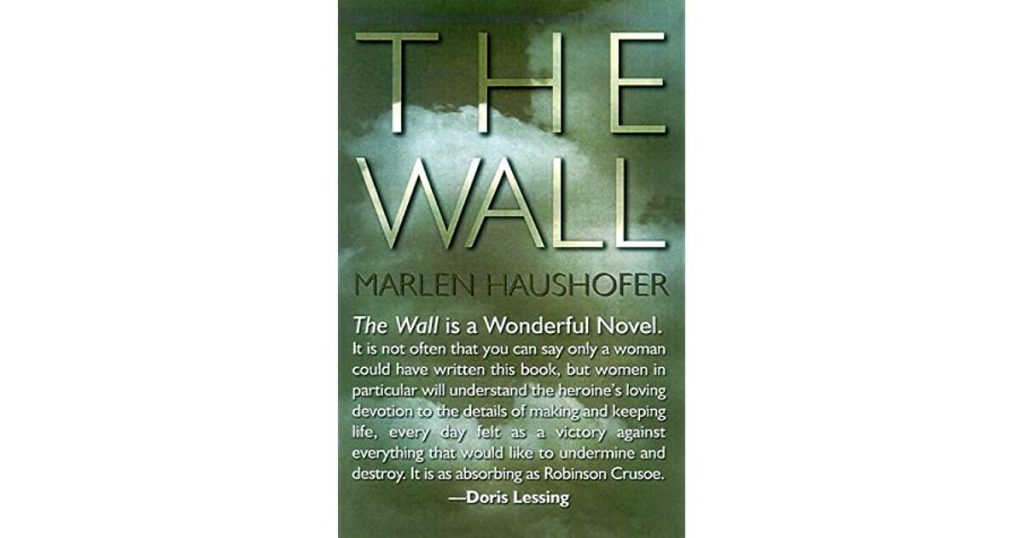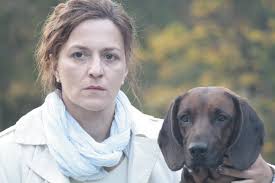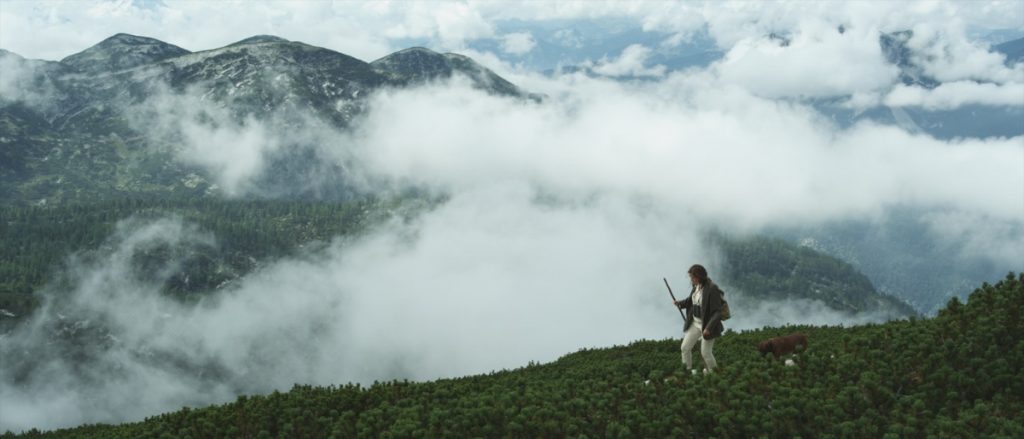Die Wand (Väggen; The Wall), Marlen Haushofer, Austria, 1963
 A woman in her late forties is invited to spend a few days with her cousin Luise and her cousin’s husband, Hugo, at their hunting lodge in the Austrian alps. The woman (whose name we are never told) is a widow with two grown children, and even though she is not enthusiastic about hunting, she relishes the idea of a break from her normal routine. Shortly after they all arrive at the lodge, her hosts take an evening walk to the nearby village while the woman remains at the lodge with the family dog, Lo (Luchs, Lynx).
A woman in her late forties is invited to spend a few days with her cousin Luise and her cousin’s husband, Hugo, at their hunting lodge in the Austrian alps. The woman (whose name we are never told) is a widow with two grown children, and even though she is not enthusiastic about hunting, she relishes the idea of a break from her normal routine. Shortly after they all arrive at the lodge, her hosts take an evening walk to the nearby village while the woman remains at the lodge with the family dog, Lo (Luchs, Lynx).
Hugo and Luise are never seen again.
While searching for her cousin the next day, the woman discovers a transparent, impenetrable wall that has locked her into her own small part of the alps; beyond the wall she is unable to see any signs of life. It slowly dawns on her that everyone must have died and that she is most probably the only person left alive. She has no idea as to what might have happened, but she is acutely aware that she must focus on surviving.

This amazing novel can be read on at least a couple of levels. Although some readers may see it as a dystopian nightmare where an unknown enemy has wiped out the population of Earth (all but one), others might perceive the wall as something that is more psychological than physical. Perhaps the wall is what protects us, or perhaps it is the thing that prevents us from being the person we believe we should be; perhaps protection and prevention are two parts of the same positive intervention. As the woman asks herself at some point in the story (in free translation): ‘Is it possible that the wall is simply a confirmation of my own childish fears?’
The woman is alone except for the dog, a cat and a cow. By focusing on the needs of her animals she is able to remain active and sane. After two years, she begins to keep a diary, written on the few scraps of paper she is able to find; she has no idea why she is doing it, because there is no one alive who will be able to read it. Once the paper comes to an end, the diary will also come to end. Once she is no longer able to tend her potatoes and beans, or chop her wood, or the cow can no longer give milk, she will come to an end. One lives and then one dies: she understands that the only meaning with life is to live it.
Without books, conversation or music her thoughts are her own, undistracted and unhampered. She is completely alone. The harsh environment of the alpine region where the story is set becomes one of the main characters, and the woman learns early on that she has to work in harmony with the environment in order to survive. She strives to be practical, living each day as it comes, aware that giving free rein to her imagination could make her overly sensitive, vulnerable and exposed.

At the beginning of her diary, in which she recounts from memory all that has happened since the day she first arrived at the hunting lodge, we learn that the dog dies. She does not say how or when, but she makes many references to his death, and this knowledge creates a certain tension in the novel. When he finally dies, his death instigates a change and a deep understanding in the woman. Throughout all of the book she relates to Lynx and her other animals (but especially Lynx) as she would to human beings.
For me, the animals in the story are parts of the woman that she has to understand, but from which she must also liberate herself. Although this is a book about inner loneliness and isolation as seen through the eyes of a woman, it is also a book about internal struggle and self-awareness. When she wonders what it would have been like had there been another person cut off with her behind the wall, she is thankful that she is alone. Had the other person been a man she would most probably have ended up in a subservient role, attending to his needs. Being completely on her own has given her the chance to truly be herself.
Beautifully written, this is a book that will most definitely remain with you long after you have finished the last page.
